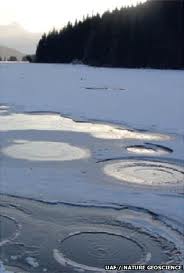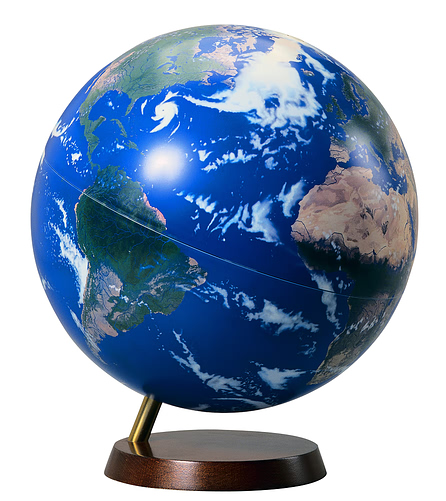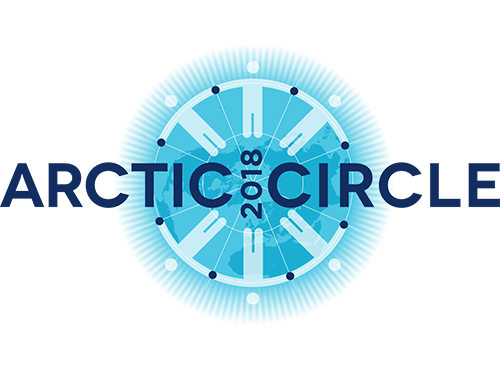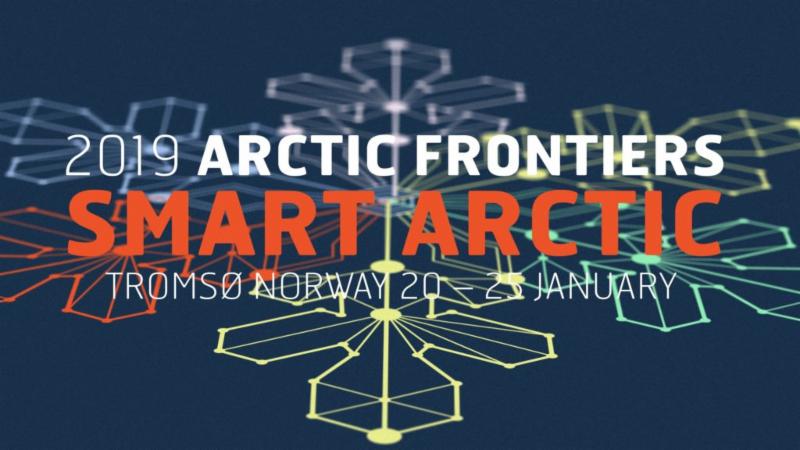|
|
|
|
|
|
|
|
Scientific Exploration of the Arctic and North Pacific (SEA-NorP), September 25-27, 2018 (Mt. Hood, Oregon USA). This workshop will include discussion of hypotheses that can be tested by scientific drilling in the region, the technology necessary to achieve those goals, ideal sites for drilling based on existing data, and where additional site survey data is needed. The goal of the workshop organizers is that multiple proposals will be initiated at the workshop, both for full cruise legs and for shorter, targeted expeditions around the following themes: ocean gateways, geohazards, volatile cycling, ice histories at transition zones, biosphere and climate.
|
Media
 Arctic Cauldron: Across the Arctic, lakes are leaking dangerous greenhouse gases, and one lake is behaving very strangely. Arctic Cauldron: Across the Arctic, lakes are leaking dangerous greenhouse gases, and one lake is behaving very strangely. Katey Walter Anthony has studied some 300 lakes across the tundras of the Arctic. But sitting on the mucky shore of her latest discovery, the Arctic expert said she'd never seen a lake like this one. Set against the austere peaks of the Western Brooks Range, the lake, about 20 football fields in size, looked as if it was boiling. Its waters hissed, bubbled and popped as a powerful greenhouse gas escaped from the lake bed. Some bubbles grew as big as grapefruits, visibly lifting the water's surface several inches and carrying up bits of mud from below. This was methane. The Washington Post
Saami Council: Railway to Arctic Ocean Will Have Major Negative Consequences for Reindeer Husbandry. "I can clearly state that there is no way for a railway from Rovaniemi to Kirkenes to be built without harming Sámi culture, traditional Sámi reindeer herding and fishing," says President of the Saami Council, Åsa Larsson Blind, to the Barents Observer. The Saami Council is a non-governmental organization promoting Sámi rights and interests. The council has Sámi member groups in Finland, Norway, Russia and Sweden. The Barents Observer
 This is Why the Earth Wobbles as it Spins, According to NASA. This is Why the Earth Wobbles as it Spins, According to NASA. The Earth doesn't just spin while on its axis, it wobbles. And scientists at NASA say they've identified three reasons why it happens. A study published in the November issue of the journal Earth and Planetary Science Letters said the wobble - scientifically labeled as "polar motion" - is caused by three factors: melting ice in Greenland, land area rising as ice sheets melt, and changes in Earth's mantle, a mostly rocky layer inside Earth between its outer crust and the core. USA Today
Arctic Weather Station to be Built in Tomsk. Experts from the Tomsk-based Institute of Monitoring of Climatic and Ecological Systems, in cooperation with Sibanalitpribor, are developing the concept of a permanent meteorological complex that would replace standard weather stations and operate as an automatic weather station. "Currently there are very few automatic weather stations in the Arctic. There are ordinary ones, and some semi-automatic ones, whose batteries require regular maintenance. Imported automatic stations are expensive. In addition, the Arctic is viewed as strategic territory, which means that some classes of foreign devices cannot be used. This is the reason why we are developing an automatic meteorological complex based on highly reliable Russian measuring devices," Vladimir Korolkov, Deputy Director at the Institute of Monitoring of Climatic and Ecological Systems, said. The Arctic
|
|
Future Events
The second Arctic Biodiversity Congress is hosted by the Conservation of Arctic Flora and Fauna (CAFF), the biodiversity working group of the Arctic Council, and the Ministry of the Environment, Finland. The second Arctic Biodiversity Congress will build on the success of the first Congress, held in 2014 in Trondheim, Norway, and will bring together scientists, policymakers government officials, Indigenous representatives, Traditional Knowledge holders, industry, non-governmental organizations, and others to promote the conservation and sustainable use of Arctic biodiversity.
** New this week ** Canada Permafrost Association Annual General Meeting, October 10-12, 2018 (Whitehorse, Yukon Canada). The Canada Permafrost Association (CPA) is being formed to address the multidisciplinary nature of permafrost-- bridging natural and social sciences, engineering, and governments. A central goal of the CPA is to assist in the transfer of knowledge between disciplines and across various demographics. This will better equip Canadians to respond to permafrost-related problems. As the inaugural meeting of the CPA, participants will take part in some of the formative discussions of the Association. In addition, there will be opportunities for participants to present research findings, keynote addresses and a field trip.
 Arctic Circle Assembly, October 2018 (Reykjavik, Iceland). The annual Arctic Circle Assembly is the largest annual international gathering on the Arctic, attended by more than 2000 participants from 60 countries. It is attended by heads of states and governments, ministers, members of parliaments, officials, experts, scientists, entrepreneurs, business leaders, indigenous representatives, environmentalists, students, activists and others from the growing international community of partners and participants interested in the future of the Arctic. Arctic Circle Assembly, October 2018 (Reykjavik, Iceland). The annual Arctic Circle Assembly is the largest annual international gathering on the Arctic, attended by more than 2000 participants from 60 countries. It is attended by heads of states and governments, ministers, members of parliaments, officials, experts, scientists, entrepreneurs, business leaders, indigenous representatives, environmentalists, students, activists and others from the growing international community of partners and participants interested in the future of the Arctic.
Arctic Science Forum Associated with the 2nd Arctic Science Ministerial, October 25, 2018 (Berlin, Germany and via webcast). How vulnerable and how resilient are nature and the people of the Arctic region? How well do we understand the regional and global dynamics which are driving change in the Arctic? What impact will change in the Arctic have on us? These and other questions are the focus of this two-day conference. It will take interdisciplinary research in the Arctic to gain an understanding of past and future processes - a complex and cost-intensive venture. This makes an international network of Arctic research so important for delivering better results. Cooperation in research, the exchange of data, collaborative observation and monitoring schemes - international cooperation is imperative in research on the Arctic.
Only the Science Forum, on October 25th, will be webcast. The Arctic Ministerial, on October 26th, will NOT be webcast.
Maritime & Arctic Security & Safety Conference (MASS18) "Arctic Technology" November 15-16, 2018 (Newfoundland & Labrador Canada). Now in its sixth year, MASS has gained an international reputation as a must-attend event to gain a wide perspective on challenges, opportunities and policies related to the Arctic and North Atlantic maritime environments. The aim of this Government of Canada and the Government of Newfoundland and Labrador supported international conference is to promote stakeholder collaboration, technological innovation, harsh environment research & development, and world-class education efforts that are contributing to both Maritime and Arctic issues. This two day conference will draw a diverse group of speakers and attendees representing government, military, Canadian and U.S. Coast Guard, industry, academic leaders, Northern Leaders, research and other key stakeholders. We hope you can join us to be a part of this important dialogue
American Geophysical Union Fall meeting, December 10-14, 2018 (Washington, DC USA). The AGU 2018 Fall Meeting will mark another dynamic year of discovery in Earth and space science, serve as the advent of AGU's Centennial year, and provide a special opportunity to share our science with world  leaders in Washington, D.C. As the largest Earth and space science gathering in the world, the Fall Meeting places you in the center of a global community of scientists drawn from myriad fields of study whose work protects the health and welfare of people worldwide, spurs innovation, and informs decisions that are critical to the sustainability of the Earth.
ArcticNet: Annual Scientific Meeting 2018, December 10-14, 2018 (Ottawa, ON Canada). Canada's North is experiencing unprecedented change in its sea and terrestrial ice, permafrost and ecosystems under the triple pressures of climate change, industrialization and modernization. The impacts of these pressures can be seen on food and energy security, shipping, sovereignty, northern community health and well-being, and sustainable development and resource exploitation. All these issues have brought the North to the forefront of national and international agendas. Building on the success of its previous Annual Scientific Meetings and International Arctic Change Conferences, the Arctic Network of Centers of Excellence announces the 14th ArcticNet Annual Scientific Meeting.
 Arctic Frontiers, January 20-25, 2019 (Tromso, Norway). The Arctic Frontiers is a global scientific conference on economic, societal, and environmental sustainable growth. This year's theme will be "Smart Arctic," with a pan-arctic emphasis, and an effort to build new partnerships across nations, generations and ethnic groups. Arctic Frontiers provides a forum for dialogue and communication between science, government and industry. The plenary program will have five main sessions: State of the Arctic, Blue Growth, Smart Solutions, Bridging the Gap, and Arctic business prospects. An abstract-driven science program will address Plastics in the Ocean, the Future of Governance and Handling Vulnerability in Arctic Ecosystems, State of the Arctic and A Smart Arctic Future.
 of the AAG includes over 8,500 geographers converging from the U.S., Canada, and nearly 60 other countries in a typical year including geographers, GIS specialists, environmental scientists, and other leaders for the latest in research and applications in geography, sustainability, and GIScience. of the AAG includes over 8,500 geographers converging from the U.S., Canada, and nearly 60 other countries in a typical year including geographers, GIS specialists, environmental scientists, and other leaders for the latest in research and applications in geography, sustainability, and GIScience.
|
|

  
4350 N. Fairfax Drive, Suite 510
Arlington, VA 22203, USA
External links in this publication, and on the USARC's World Wide Web site ( www.arctic.gov) do not constitute endorsement by the US Arctic Research Commission of external Web sites or the information, products or services contained therein. For other than authorized activities, the USARC does not exercise any editorial control over the information you may find at these locations. These links are provided consistent with the stated purpose of this newsletter and the USARC Web site.
|
|
|
|
|
|
|
|
|
 Arctic Cauldron: Across the Arctic, lakes are leaking dangerous greenhouse gases, and one lake is behaving very strangely. Katey Walter Anthony has studied some 300 lakes across the tundras of the Arctic. But sitting on the mucky shore of her latest discovery, the Arctic expert said she'd never seen a lake like this one. Set against the austere peaks of the Western Brooks Range, the lake, about 20 football fields in size, looked as if it was boiling. Its waters hissed, bubbled and popped as a powerful greenhouse gas escaped from the lake bed. Some bubbles grew as big as grapefruits, visibly lifting the water's surface several inches and carrying up bits of mud from below. This was methane. The Washington Post
Arctic Cauldron: Across the Arctic, lakes are leaking dangerous greenhouse gases, and one lake is behaving very strangely. Katey Walter Anthony has studied some 300 lakes across the tundras of the Arctic. But sitting on the mucky shore of her latest discovery, the Arctic expert said she'd never seen a lake like this one. Set against the austere peaks of the Western Brooks Range, the lake, about 20 football fields in size, looked as if it was boiling. Its waters hissed, bubbled and popped as a powerful greenhouse gas escaped from the lake bed. Some bubbles grew as big as grapefruits, visibly lifting the water's surface several inches and carrying up bits of mud from below. This was methane. The Washington Post This is Why the Earth Wobbles as it Spins, According to NASA. The Earth doesn't just spin while on its axis, it wobbles. And scientists at NASA say they've identified three reasons why it happens. A study published in the November issue of the journal Earth and Planetary Science Letters said the wobble - scientifically labeled as "polar motion" - is caused by three factors: melting ice in Greenland, land area rising as ice sheets melt, and changes in Earth's mantle, a mostly rocky layer inside Earth between its outer crust and the core. USA Today
This is Why the Earth Wobbles as it Spins, According to NASA. The Earth doesn't just spin while on its axis, it wobbles. And scientists at NASA say they've identified three reasons why it happens. A study published in the November issue of the journal Earth and Planetary Science Letters said the wobble - scientifically labeled as "polar motion" - is caused by three factors: melting ice in Greenland, land area rising as ice sheets melt, and changes in Earth's mantle, a mostly rocky layer inside Earth between its outer crust and the core. USA Today


